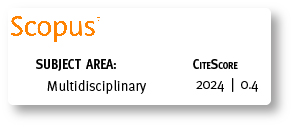Teacher attitudes towards inclusive education in Cuenca
DOI:
https://doi.org/10.18537/mskn.07.01.02Keywords:
inclusive education, attitudes, sex, age, training, years of teachingAbstract
The definition of inclusive education underwent over the years important changes, which finally led to the denotation that education is a right for everyone. The research, presented in this paper, examined teachers’ attitudes towards inclusive education in public and private elementary schools in the city of Cuenca. The methodology consisted of a cross-sectional quantitative observational survey using the questionnaire of Tárraga et al. (2013). A modified version of this questionnaire was subjected to a study population of 650 docents, selected on the basis of a stratified probabilistic method. After a preliminary analysis of the reliability and the structural scale of the questionnaire, the item scale and components of the questionnaire were reduced respectively from twenty to fifteen, and from four to three. Results revealed that teachers in general have a nonchalant, tending to favorable, attitude towards inclusive education. It was found that the more positive attitude is associated with the younger generation of docents with few years of service. No significant relationship between attitude and sex of teachers was found; but an association with the training area of the docents, their educational level, and previous experience with inclusive child education and institutional support (public or private) was found. However, given the groups were of unequal size, results presumably not generalize to a wide range of similar situations.
Downloads
Metrics
References
Ainscow, M., S. Miles, 2008. Por una educación para todos que sea inclusiva: Hacia dónde vamos ahora. Perspectivas, 38(1), 17-44.
Álvarez, M., P. Castro, M.Á. Campo-Mon, E. Álvarez-Martino, 2005. Actitudes de los maestros ante las necesidades educativas específicas. Psicothema, 17(4), 601-606.
Avramidis, E., B. Norwich, 2004. Las actitudes de los profesores hacia la integración y la inclusión: revisión de la bibliografía sobre la materia. Entre dos mundos: Revista de traducción sobre discapacidad visual, 25, 25-44.
Barton, L., 2011. La investigación en la educación inclusiva y la difusión de la investigación sobre discapacidad. Revista interuniversitaria de Formación del Profesorado, 25(70), 63-76.
Cardona, M., 2001. Líneas de investigación en educación inclusiva. Elx. Regidoria d’Educació. Disponible en: http://rua.ua.es/dspace/handle/10045/24895, 12 pp.
Center, Y., J. Ward, 1987. Teachers’ attitudes towards the integration of disabled children into regular schools. The Exceptional Child, 34(1), 41-56.
Chiner Sanz, E., 2011. Las perspectivas y actitudes del profesorado frente a las integraciones de niños/as con necesidades educativas especiales al aula común. Disponible en: http://www.repositoriocdpd.net:8080/handle/123456789/78.
Damm, X., 2009. Representaciones y actitudes del profesorado frente a la integración de Niños/as con Necesidades Educativas Especiales al aula común. Revista Latinoamericana de Educación Inclusiva, 3(1), 25-35.
de Boer, A., S.J. Pijl, A. Minnaert, 2010. Regular primary schoolteachers’ attitudes towards inclusive education: A review of the literature. International Journal of Inclusive Education, 15(3), 331-353.
Eagly, A.H., S. Chaiken, 1993. The psychology of attitudes. Fort Worth, TX: Harcourt Brace Jovanovich College Publishers.
Echeita, G., 2004. ¿Por qué Jorge no puede ir al mismo colegio que su hermano? Un análisis de algunas barreras que dificultan el avance hacia una escuela para todos y con todos. Revista Iberoamericana sobre Calidad, Eficacia y Cambio en Educación (REICE), 2(2), 30-42.
Echeita, G., M. Sandoval, 2002. Educación inclusiva o educación sin exclusiones. Disponible en: http://www.mecd.gob.es/dctm/revista-de-educacion/articulos327/re3270310520.pdf? documentId=0901e72b812598aa, 8 pp.
Granada, M., M. Pomés, S. Sanhueza, 2013. Actitud de los profesores hacia la inclusión educativa. Papeles de Trabajo, 25, 51-59. Disponible en: http://www.ucm.cl/1200.html.
Hastings, R., S. Oakford, 2003. Student teachers’ attitudes towards the inclusion of children with special needs. Educational Psychology, 23(1), 87-94.
Henríquez, S., M. Azcárraga, L. Cóppola, 2012. Actitudes del profesorado de Chile y Costa Rica hacia la inclusión educativa. Cadernos de Pesquisa, 42, 884-889.
Hernández, R., C. Fernández, P. Baptista, 2014. Metodología de la investigación (6ª ed.). México: McGraw Hill, 188pp.
Opertti, R., C. Belalcázar, 2008. Tendencias de la educación inclusiva a nivel regional e interregional: temas y desafíos. Perspectivas, 38(1), 149-179.
Padeliadu, S., V. Lampropoulou, 1997. Attitudes of special and regular education teachers towards school integration. European Journal of Special Needs Education, 12(3), 173-183.
Parrilla Latas, Á., 2002. Acerca del origen y sentido de la educación inclusiva. Revista de Educación, (327), 11-29.
Tárraga, R., C. Grau, J. Peirats, 2013. Actitudes de los estudiantes del Grado de Magisterio y del Máster de Educación Especial hacia la inclusión educativa. Profesorado, 16(1), 55-72.
Downloads
Published
How to Cite
Issue
Section
License
Copyright © Autors. Creative Commons Attribution 4.0 License. for any article submitted from 6 June 2017 onwards. For manuscripts submitted before, the CC BY 3.0 License was used.
![]()
You are free to:
 |
Share — copy and redistribute the material in any medium or format |
 |
Adapt — remix, transform, and build upon the material for any purpose, even commercially. |
Under the following conditions:
 |
Attribution — You must give appropriate credit, provide a link to the licence, and indicate if changes were made. You may do so in any reasonable manner, but not in any way that suggests the licenser endorses you or your use. |
| No additional restrictions — You may not apply legal terms or technological measures that legally restrict others from doing anything the licence permits. |









